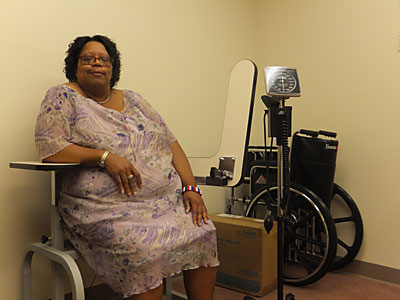Its
staff integrates physical, mental treatment on an unprecedented scale
By
Nick Tabor, New Era Senior Staff Writer
Several years ago, Shirley Porter’s depression and physical ailments were preventing her from keeping a job — and thus from affording medical treatment.
She knew she faced the risk of diabetes, and she
knew her blood pressure sometimes shot up too high. But Porter, now 49, felt so
lethargic some mornings that she struggled just to brush her teeth and comb her
hair.
One day, she told her therapy group at the Pennyroyal Mental Health
Center her head ached and
her arm felt a little numb.
The Pennyroyal
Center was in the early
stages of developing its primary care center. A nurse checked Porter’s blood
pressure. It was 217 over 135 — high enough to cause a stroke.
Medical
staff rushed her to a hospital, where she stayed for several days.
After
she stabilized, a Pennyroyal
Center nurse started
checking her blood pressure and weight every week. The staff coached her
closely on her daily diet. Her case manager helped her get accepted at St. Luke
Free Clinic.
In
a recent test, roughly two years since her hospital visit, Porter’s blood
pressure registered at 158 over 94, said Lisa Bridges, a registered nurse.
“I’ve
told doctors that if I wasn’t here, I’d be dead,” Porter said Wednesday as she
sat in a community room at the Pennyroyal
Center.
The
Pennyroyal Center
is trying to integrate physical and mental treatment on a scale apparently
without precedent in Kentucky.
Director David Ptaszek said the center is designing its own approach with some
guidance from a facility near Knoxville,
Tenn.
“Certainly,
for this area, it’s very much cutting-edge,” said Dr. David Gray, a Pennyroyal Center psychiatrist.
Providing
the full spectrum of treatment on a single campus helps staff on both sides
communicate better, tailor treatments, and monitor patients more closely, staff
members said. It’s a fundamentally team-oriented approach.
Close
communication
The
primary care clinic occupies the basement of a building at the Pennyroyal Center’s North Drive campus. It has four exam rooms,
two full-time doctors and several other staff members, and each of the doctors
at Bluegrass MD works there one day a week, Bridges said.
The
clinic concentrates on hypertension, diabetes and heart disease, she said.
Mentally
ill clients often don’t seek medical treatment, even when their counselors goad
them, Gray said. The primary care clinic aims to solve this problem.
When
Gray takes on a new patient, he typically questions the person about their
medication and their medical problems. He also tries to stay posted on each
patient’s physical state.
If
Gray thinks a client needs medical treatment, he can help schedule a doctor’s
appointment in the same building as his own office — sometimes for the same
day.
“There’s
really no substitute for what I call a warm hand-off,” he said. “You remove
some of those steps which sometimes become obstacles.”
Further,
because the Pennyroyal
Center keeps digital
records on every client, counselors can monitor which medications the clinic’s
doctors are assigning, Bridges said. If any medication is causing mental side
effects, the counselor can work with the doctor to optimize the patient’s
prescription.
False
dichotomy
But
the benefits go deeper than mere logistics, Gray said. The integrated model
lets staff capitalize on the connections between the body and the mind.
For
instance, a client suffering from depression might not need psychiatric
medication, Gray said. High blood pressure can cause lethargy and tiredness
similar to the effects of depression. So can thyroid problems.
“The
person would not be best served if their thyroid wasn’t working properly, and I
just gave them an anti-depressant,” Gray said.
Now
he can work with the primary care clinic to pinpoint the source of patients’
problems.
In
addition to his psychiatric internship, Gray also did an internship in internal
medicine. He came to the Pennyroyal
Center for the chance to
integrate the two disciplines.
“It’s
a false dichotomy to think there’s a separation between the mind and the body,”
he said.
But
this dichotomy creates problems in the medical system, Bridges said.
“People
tend to look at medical care in silos,” she said. “Like they’re very
disjointed.”
So
far, the primary care center has mostly treated the Pennyroyal Center’s
existing mental health clients, but it announced Saturday it is accepting
everyone who has insurance or can pay out-of-pocket.
The
integration model can work in both directions, Bridges said. At present, mental
health clients get coaching on physical health. Bridges hopes new patients will
come in seeking physical treatment and open up to the possibility of mental
treatment. The office’s doctors can perform depression screenings.
The
clinic is open 9 a.m. to 6 p.m. every day. For more information, or to schedule
an appointment, call 270-887-6152.


No comments:
Post a Comment